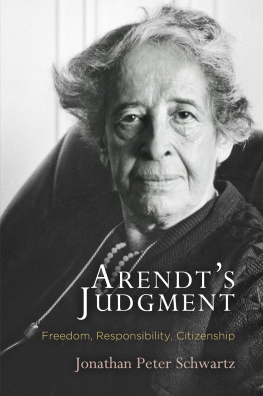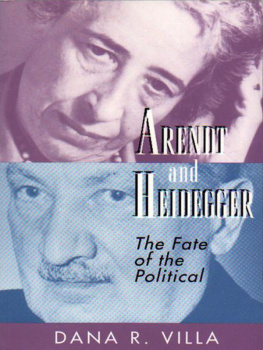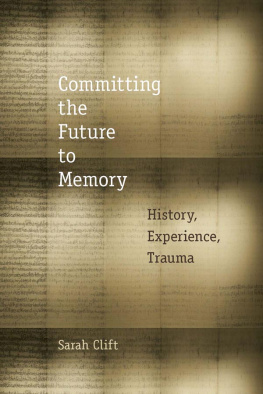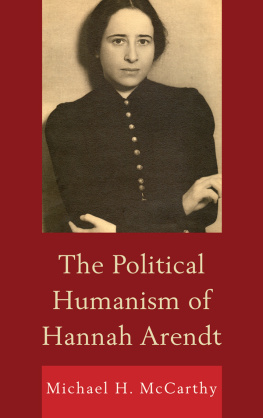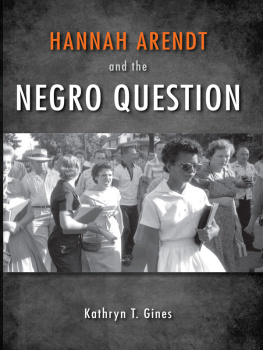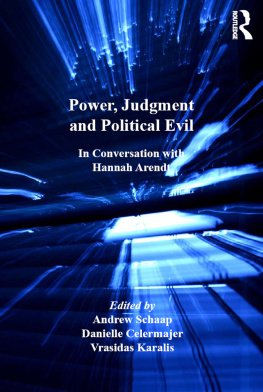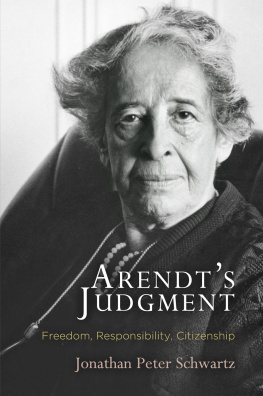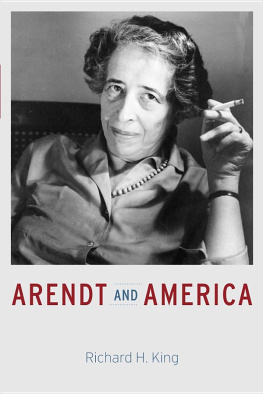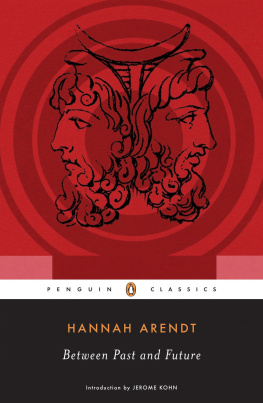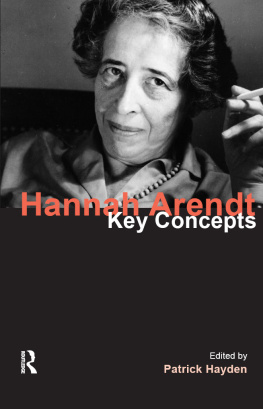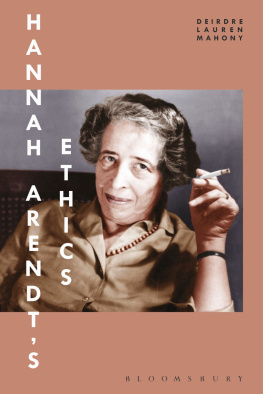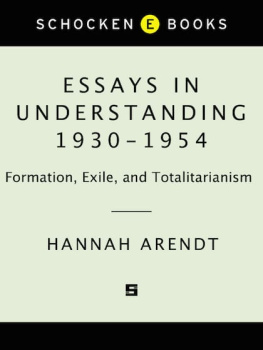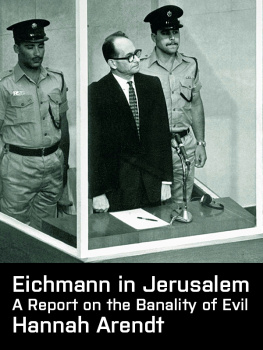Arendt Hannah - Arendts judgment freedom, responsibility, citizenship
Here you can read online Arendt Hannah - Arendts judgment freedom, responsibility, citizenship full text of the book (entire story) in english for free. Download pdf and epub, get meaning, cover and reviews about this ebook. City: Philadelphia, year: 2016, publisher: University of Pennsylvania Press, Inc., genre: Romance novel. Description of the work, (preface) as well as reviews are available. Best literature library LitArk.com created for fans of good reading and offers a wide selection of genres:
Romance novel
Science fiction
Adventure
Detective
Science
History
Home and family
Prose
Art
Politics
Computer
Non-fiction
Religion
Business
Children
Humor
Choose a favorite category and find really read worthwhile books. Enjoy immersion in the world of imagination, feel the emotions of the characters or learn something new for yourself, make an fascinating discovery.
- Book:Arendts judgment freedom, responsibility, citizenship
- Author:
- Publisher:University of Pennsylvania Press, Inc.
- Genre:
- Year:2016
- City:Philadelphia
- Rating:3 / 5
- Favourites:Add to favourites
- Your mark:
- 60
- 1
- 2
- 3
- 4
- 5
Arendts judgment freedom, responsibility, citizenship: summary, description and annotation
We offer to read an annotation, description, summary or preface (depends on what the author of the book "Arendts judgment freedom, responsibility, citizenship" wrote himself). If you haven't found the necessary information about the book — write in the comments, we will try to find it.
Arendts judgment freedom, responsibility, citizenship — read online for free the complete book (whole text) full work
Below is the text of the book, divided by pages. System saving the place of the last page read, allows you to conveniently read the book "Arendts judgment freedom, responsibility, citizenship" online for free, without having to search again every time where you left off. Put a bookmark, and you can go to the page where you finished reading at any time.
Font size:
Interval:
Bookmark:

Arendts Judgment
HANEY FOUNDATION SERIES
A volume in the Haney Foundation Series, established in 1961 with the generous support of John Louis Haney
Arendts Judgment
Freedom, Responsibility, Citizenship
Jonathan Peter Schwartz

Copyright 2016 University of Pennsylvania Press
All rights reserved. Except for brief quotations used for purposes of review or scholarly citation, none of this book may be reproduced in any form by any means without written permission from the publisher.
Published by
University of Pennsylvania Press
Philadelphia, Pennsylvania 19104-4112
www.upenn.edu/pennpress
Printed in the United States of America on acid-free paper
10987654321
Library of Congress Cataloging-in-Publication Data
Names: Schwartz, Jonathan Peter, author.
Title: Arendts judgment : freedom, responsibility, citizenship / Jonathan Peter Schwartz.
Other titles: Haney Foundation series.
Description: Philadelphia : University of Pennsylvania Press, [2016] | Series: Haney Foundation series | Includes bibliographical references and index.
Identifiers: LCCN 2015038852 | ISBN 9780812248142 (alk. paper)
Subjects: LCSH: Arendt, Hannah, 19061975. | JudgmentPolitical aspects. | Political participation. | Political sciencePhilosophy.
Classification: LCC JC251.A74 S398 2016 | DDC 320.01dc23
LC record available at http://lccn.loc.gov/2015038852
Contents
Preface
In some ways, this book has been fifteen years in the making. Many of the questions that animate it are questions I was thinking about long before I began researching answers to them. Like many other political observers, the events that dominated the beginning of the last decade altered my political consciousness: the contested 2000 election; the 9/11 attacks; the so-called War on Terror; the buildup to the invasion of Iraq; George W. Bushs reelection. These events raised questions for me that I have searched for answers to ever since. What struck me about that period at the time, and has continued to ever since, was the realization that our world is much less intractable than we often think, that decisions and courses of action of specific individuals can have tremendous consequences. A bad or good judgment can change the world. Frankly, I continue to believe that a series of bad judgments were made during this era. Yet, I was also struck by the immense challenges to good judgment that those faced with the responsibility were confronted with, which left me with a grudging admiration for their willingness to act and judge at all. Rightly or not, a period of existential fear gripped American politics after the 9/11 attacks, and those who made decisions, along with those who supported and opposed them, had to make judgments in a climate of deep anxiety in a modern world characterized by opacity, potency, and immense complexity. But more than anything else, I was struck by the fact that people seemed able to honestly arrive at profoundly different conclusions about the world, even though they were often working from a common set of facts. Why was this possible? What were the human faculties that enabled better or worse judgments? How do we even know, finally, when a good or bad judgment has been made? Moreover, while I recognized this obvious, if obscure, possibility of legitimate differences of opinion, I also became convinced that this was not the only factor in play. There were what seemed to be gaps in the practical reason of many individuals, which they tried to fill with what can only be characterized as an ideology: a peculiar way of judging that reduces the complexity of the world to a simplistic normative-theoretical model, allowing the agent to cognitively exclude any dissonant information. All these questions seemed to lead me, almost inexorably, to look to Hannah Arendt for answers.
Defining good judgment is notoriously difficult: two and half millennia after Aristotle, it remains one of the most elusive yet self-evident human faculties. We commonly recognize it as among the great human goods; though we may initially think to place other goods above it, such as peace, justice, virtue, happiness, or liberty, these can only be realized where good judgment exists. When we elect political leaders, it is good judgment more than anything else we hope they will exercise, for though their ideological position may seem more significant, it will be worthless to us if they lack the judgment to bring that political vision into reality. And given the increasing interconnectedness, complexity, and centralization of modern societies and economies, the ecological challenges of our times, and the massive destructive power in the hands of our regimes, judgment perhaps is more important than ever before. Yet, despite the obvious importance of judgment, it is difficult to understand exactly what it is. We can point to examples of good judgment, such as Lincoln, Mandela, or Martin Luther King, and even more often to instances of bad judgment too innumerable to mention. But it is difficult to put a finger on exactly what made one person effective, while others failed. It is clearly not due to simply having more knowledge, since two people may have similar information about a matter and still arrive at very different judgments. Good judgment instead seems to involve a certain kind of insight into circumstances and an ability to summon up just the right response to that insight: a kind of common sense that, while potentially sharpened by greater knowledge, is still something separate from it.
So how then can we define good judgment? Following Kant, we might define judgment as the ability to subsume particulars under general rules. This is a very abstract account, but it seems to capture some of our basic intuitions. The most obvious case of such judgment in political life is a judges ruling in court, deciding whether the particular case can be subsumed under some law or precedent. However, in the arena of politics judgment seems to extend further than this. When we talk about the proverbial relationship between theory and practice, we are discussing judgment; but the fundamental question about this relationship has always been what constitutes At the very least, regardless of how we define them, we seem to have to understand judgment as, in some sense, the establishment of a relationship of our mental activities with our activities in the actual world. But this last characterization still seems too abstract to give us real purchase on our question; an analytic approach can perhaps help us orient ourselves in a general way, but it does not give us much to go on.
These perplexities led me to take another approach, examining the ideas of a thinker who I will argue devoted her lifes work to concretely understanding the nature of judgment: Hannah Arendt, whose theory of political judgment I believe to be the most significant consideration of the topic since Aristotle. Arendt believed that understanding the nature of political judgment and the sources of its validity required a dramatic rethinking of what theory and practice are, and how they are related to each other. I believe an examination of her thinking on this question can help us come to terms with the question of judgment and, in the process, give us a deeper view of the importance of judgment for politics in our time. Perhaps it may even help us make better decisions in the future, as we still stand at the outset of a century that arguably poses extraordinary political challenges, not just for America, but for the whole world. This, at least, has been my hope in writing this book.
Next pageFont size:
Interval:
Bookmark:
Similar books «Arendts judgment freedom, responsibility, citizenship»
Look at similar books to Arendts judgment freedom, responsibility, citizenship. We have selected literature similar in name and meaning in the hope of providing readers with more options to find new, interesting, not yet read works.
Discussion, reviews of the book Arendts judgment freedom, responsibility, citizenship and just readers' own opinions. Leave your comments, write what you think about the work, its meaning or the main characters. Specify what exactly you liked and what you didn't like, and why you think so.

